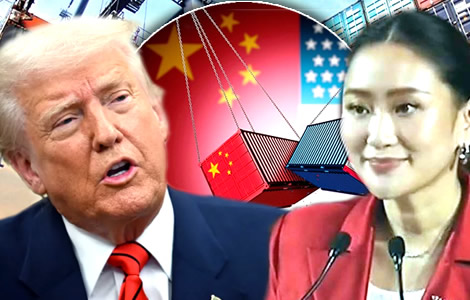Trump tariffs expose China’s economic colonisation of Thailand, revealing soaring exports but collapsing factories and rising imports. With US trade talks under pressure and regional rivals gaining, Thailand faces a critical crossroads to reclaim its industrial future.
Thailand is staring down a brutal truth. The Trump trade crisis has exposed the fragility of its export-driven economy — and the cracks are widening fast. High-level talks with U.S. trade officials are happening under pressure. But what’s clearer by the day is this: Thailand isn’t in control of its own game. Chinese transshipment schemes, rising import dependence and hollowed-out factories have turned the country into a glorified assembly line. The data paints a damning picture. Exports hit record highs in early 2025 — yet factories keep shutting their doors. Jobs vanish. Local value creation? Barely there. The so-called boom is a mirage.

Behind the numbers lies a deeper problem: China’s grip. Whether through a flood of cheap imports or “zero-dollar” factory setups that extract value without investing in Thailand, the trend is unmistakable. This isn’t trade. It’s economic colonisation.
If Thai leaders don’t act with clarity and force — now — the country risks becoming a shell of an economy, propped up by another nation’s interests and stripped of its own industrial future.
US import tariffs increase pressure on Thailand amid regional trade competition and government uncertainty
Thailand is under mounting pressure. The United States is preparing to impose a 36% import tax on Thai exports. This tariff, labelled the “Trump Tax,” has triggered alarm in Bangkok. Policymakers are scrambling, yet their response remains confused and fragmented.
Although the U.S. move was not entirely unexpected, it strikes at a difficult moment. Thailand already faces fierce competition from Vietnam and Indonesia. The just announced U.S.-Indonesia trade deal only worsens Thailand’s situation. Consequently, Bangkok now risks being sidelined in regional trade dynamics.
In response, the urgency is rising in Thailand. However, officials appear unsure of their strategy. Should they retaliate or negotiate? The lack of a consistent message has left the public disoriented. Meanwhile, businesses anxiously await guidance.
One core issue is Thailand’s growing dependence on foreign-led, low-value-added manufacturing. For example, Chinese firms increasingly shift operations to Thailand. They aim to avoid U.S. tariffs on direct exports. These operations drive up Thai export volumes but offer little domestic value.
Record exports hide rising imports and job losses that expose deep structural flaws in the Thai economy
On Monday, Thita Phekanon from SCB’s Economic and Business Research Centre issued a dire warning. Her report, titled “Import Influx Trap… Thai Economic Trap in the Era of High Import Dependence,” drew widespread attention.
She noted an alarming paradox. Exports are at record highs. Yet factories continue to shut down. Jobs are disappearing. This contradiction signals deep structural flaws in the Thai economy.
Import volumes are soaring. Currently, imports make up 53% of Thailand’s GDP. Much of this is driven by Chinese goods. Worryingly, Chinese exports to Thailand are growing four times faster than the global average.
As a result, Thai manufacturers are under siege. Local producers cannot compete with a flood of cheaper Chinese imports. Many industries are suffering. For instance, Thai textile, machinery and packaging firms are shrinking fast.
Thousands of Thai factories serve as low-value processors to bypass US trade rules amid growing tariffs
Thita estimates that up to 3,000 Thai manufacturers operate as low-value processors. These companies often import semi-finished products from China. Then, they conduct minimal assembly and re-export. This strategy likely aims to bypass U.S. trade restrictions.
Thus, American officials have grown wary. They suspect origin masking. Current U.S.-Thai trade talks focus heavily on verifying product sources. If irregularities are proven, even harsher penalties could follow.
Thai academics are proposing different strategies. At Thammasat University, Associate Professor Dr. Chutathip Chongwanich offers a nuanced view. She disagrees with Vietnam’s zero-tariff model. Instead, she recommends a moderate tariff range—between 25% and 28%.
This compromise, she argues, preserves competitiveness. Moreover, it offers room for further negotiation. Thailand, she insists, is not ready for full liberalisation. Key sectors, especially agriculture, remain vulnerable.
Experts warn rapid tariff cuts threaten small farmers while proposing strategic imports to gain US goodwill
Dr. Chutathip warns of devastating consequences if tariffs are slashed too quickly. Small farmers cannot survive such shocks. To gain U.S. goodwill, she proposes boosting imports of strategic goods. Items like natural gas, aircraft and military equipment could become leverage.
However, time is slipping away. The Trump Tax is scheduled to begin on August 1. Without urgent countermeasures, Thai exporters will suffer massive losses. Emergency funds are needed now. Export market diversification is also vital.
Another reformist voice is Dr. Achanan Kopaiboon, also from Thammasat. He believes the crisis signals the need for structural change. Thailand must reform outdated foreign investment laws.
Thailand has long leaned on foreign direct investment (FDI). Yet many foreign firms use nominee structures. These arrangements allow foreigners to control Thai businesses illegally. The 1999 Foreign Business Act prohibits such setups.
Nominee foreign ownership obscures real data and limits benefits, calling for urgent legal reform in Thailand
According to Dr. Achanan, nominee practices distort data. Policymakers cannot track real ownership. Furthermore, these foreign ventures often bring few benefits. Job creation and technology transfers remain low.
He advocates for a thorough legal review. Some rules are overly strict. Others lack enforcement. Thailand’s ageing population and labour shortages make selective liberalisation urgent. Still, regulation must be firm and transparent.
Thailand risks losing its manufacturing identity. Increasingly, it acts as a transit hub. Goods arrive, receive minimal processing and are shipped elsewhere. Domestic value is vanishing.
The SCB EIC report identifies three causes of this import surge:
First, China’s slowdown led to overproduction. These surplus goods now flood Southeast Asia. Thailand, with open borders, absorbs much of the excess.
Changing consumer habits for imported inputs undermine local industries and internal supply chains
Second, global e-commerce has changed buying patterns. Thai consumers buy directly from Chinese platforms. These online sellers undercut local prices, damaging domestic brands.
Third, businesses across industries prefer imported inputs. From food to construction, local raw materials are being replaced. This weakens internal supply chains.
If these trends continue, the Thai economy could hollow out. Local industries might collapse. Workers could be sidelined from regional value chains. Thailand may devolve into a re-shipping hub.
To avoid this fate, SCB EIC suggests a three-pronged approach. First: protection. Shield strategic sectors from predatory pricing. Second: regulation. Enforce foreign investment laws strictly. Third: promotion. Upgrade industries through innovation and skills.
In contrast, the U.S. has strengthened ties with Indonesia. President Trump announced a trade pact on July 15 via Truth Social. Though details remain sparse, it promises reduced tariffs and market access.
New US-Indonesia trade pact boosts Indonesia’s exports while Thailand misses critical opportunities to act
Indonesia, which has an $18 billion trade deficit with the U.S., stands to benefit. Key exports like palm oil, electronics, and seafood will gain traction. The agreement boosts Indonesia’s economy and diplomatic standing.
Thailand sees this as a missed opportunity. The U.S. rewards agility and decisiveness. In contrast, Thailand appears hesitant and indecisive.
The timing couldn’t be worse. At the ASEAN Foreign Ministers’ Meeting, Foreign Minister Marist Sengiampong met U.S. Secretary of State Marco Antonio Rubio. Thailand requested more time. The U.S. agreed to extend discussions beyond August 1.
Nonetheless, the window is small. Experts warn that investor confidence is fragile. Delays could cost more than tariffs. Lost trust is hard to recover.
Looming behind this crisis is a deeper question. What kind of economy does Thailand want to be? Will it produce and innovate? Or will it simply import and re-export?
The next fortnight is crucial for Thailand’s economic future amid urgent calls for clear strategy and reform
The answer remains unclear. But the next fortnight is crucial. Decisions made now could shape the country’s future.
Thailand must act with resolve. The government should deliver clear messages. Domestic industries must be protected. Trade diplomacy must be strategic and bold.
More importantly, reforms should outlive the immediate crisis. Investment laws need modernisation. Enforcement mechanisms require strengthening. Industrial policy must emphasise value creation.
Thai SME sector raises the alarm as the government struggles to deal with a fast-moving US tariff crisis
Thaksin joins Thai tariff crisis talks at Phitsanulok Mansion. Confirms real fears of Chinese retaliation
This is more than a tariff issue. It’s about national identity in a new global order. The Trump Tax, though painful, could be the jolt Thailand needs.
Bold leadership can turn this around. Smart policy can rebuild trust and competitiveness. Delay, however, could bring decline.
The world moves quickly. Thailand must not be left behind.


















